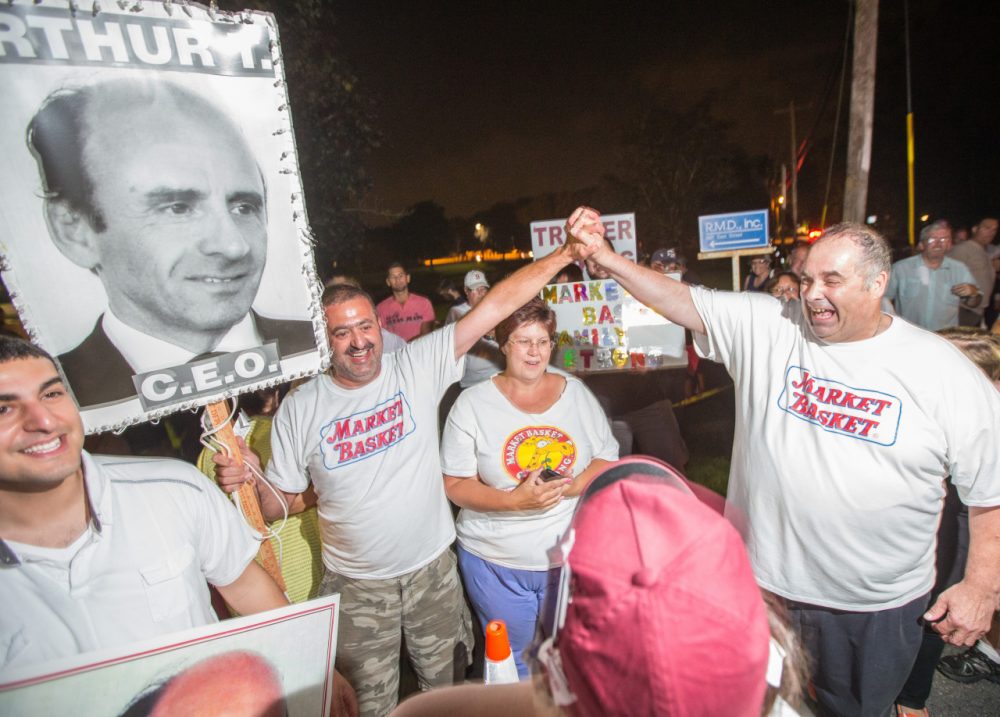Advertisement
Market Basket Shows Power Of Organized Labor Without Unions
Resume
As Market Basket workers restock shelves after their astonishing victory last week, Massachusetts labor leaders are taking stock, too.
"Everybody’s been talking," said Dennis Irvin, of the United Steelworkers Union Local 12012 in Melrose, at Boston's annual Labor Day Breakfast. "It’s just everywhere, every...you know, Market Basket."
Market Basket workers should be incredibly proud of what they accomplished, Irvin said. They not only won their chief demand, to bring back their fired CEO, but they also forced the owners to hand over their shares too.
"I’ve never seen anything like it, that’s for sure, and they prevailed, which is even stranger," Irvin said, shaking his head. "They took on this and forced these people to sell their shares to this one guy. It’s amazing, totally amazing!"
So amazing that Irvin says Market Basket would rank as one of the greatest accomplishments in union history in New England. A history lined with progressive milestones for child labor, the eight-hour workday and safer workplace standards.
But Market Basket isn't making union history. Its workers are non-union. Many are actually anti-union.
"This company never needed, or ever will need, a union," said operations supervisor Joe Schmidt outside Market Basket headquarters in Tewksbury. "We’re far stronger than that."
Schmidt helped organize the six-week-long worker protests. He said having a union would have gotten in the way of what workers wanted.
"Just think of it, there’s no union dues or union fees," Schmidt said. "And look what has been accomplished."
It's an astonishing statement to make in Tewksbury, in the same Merrimack River Valley home to some of the greatest moments in Massachusetts labor history. This summer, Market Basket workers walked off the job at a warehouse in Lawrence, the site of the Bread & Roses strike a century ago.
So how did Market Basket workers successfully organize without being unionized? For one, they used the Internet instead of a standing organization with paid staff. Through a website and social media, they rapidly planned rallies and protests.
This also was not a customary strike with workers pitted against management over benefits or working conditions. Instead, managers joined rank-and-file workers in bringing down the company. Without experienced supervisors such as Schmidt to help them, replacement workers brought in by the executive team didn't really know what to do.

There was one other difference: Workers allied with management, who rallied around a lone demand: the return of an executive.
"That is something that is not covered by the National Labor Relations Act," said Kate Bronfenbrenner, who teaches labor relations at Cornell University.
Market Basket workers wrote a new playbook, Bronfenbrenner said. It shows how outdated national labor law is. It also shows the power of managers joining regular workers in collective action, she said. Bronfenbrenner said she expects that combination to become more common across the country.
"These companies are becoming so rich," she said of corporations. "This discrepancy, this gap, has gotten so bad that even supervisors and managerial employees are saying: 'We want our fair share too.'"
But under current labor law, managers are not protected the same way rank-and-file workers are. Supervisors can be fired if they walk off the job. That’s what happened to Market Basket supervisors such as Schmidt. But what made him risk his job? He said the grocery store chain is a special case.
"The difference with this company is that it’s a family company," Schmidt said. "And the people aren’t only co-workers; they’re also family members. So, to be able to duplicate this in the modern business world, I think it would be very difficult to find people as dedicated and loyal to a particular company as the people in this company, and I think that’s the point."
That's the kind of solidarity that used to be the hallmark of labor unions.
This segment aired on September 3, 2014.
